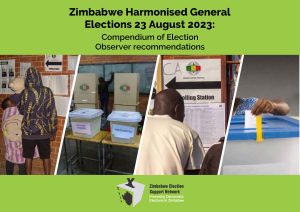University of Zimbabwe (UZ) and the Zimbabwe Election Support Network (ZESN)
TITLE: AN OVERVIEW OF ELECTIONS IN ZIMBABWE: 1980 TO PRESENT
Since 1980, several elections have been conducted in Zimbabwe. Scholars like Sithole and Makumbe (1997) begin their prognosis of electoral politics in Zimbabwe in 1979 following the ‘internal settlement’ elections which saw the creation of the transitional government which for the first time included moderate black nationalists in the executive council, Bishop Abel Muzorewa, Ndabaningi Sithole and Jeremiah Chirau. Ian Smith retained his position as the Prime Minister. Following the short-lived internal settlement government, Southern Rhodesia transitioned to become Zimbabwe, a state that joined others in the international community with justiciable rights under international law after the conduct of the 1980 elections. During this historic election, voter turnout was relatively high reflecting the enthusiasm and hope for a new dawn. The turnout could also possibly highlight the need from the warring parties for an immediate ceasefire. Voter turnout during the 1980 elections was 94% (Chikwanha-Dzenga et al.,), a percentage that has never been reached again in the subsequent elections in the country four decades later. The proportional representation (PR) system was used during this election and later abandoned during the 1985 elections onwards (Sachikonye 2001). Since then, the single-member district (SMD) or first-past-the-post is the dominant electoral system used in the country. The PR system was reintroduced following the adoption of the women’s quota in the Constitution of Zimbabwe Amendment No. 20 in 2013.
The significance of the 1980 elections to Zimbabwean politics should not be understated. Several key institutional and legal set up in the country’s present electoral architecture find their origins from this election. For instance, the use of indelible ink remains a fundamental feature to the Zimbabwean elections. Although Zimbabwe has consistently held elections since independence, the quality of those elections has been questioned on several points.
